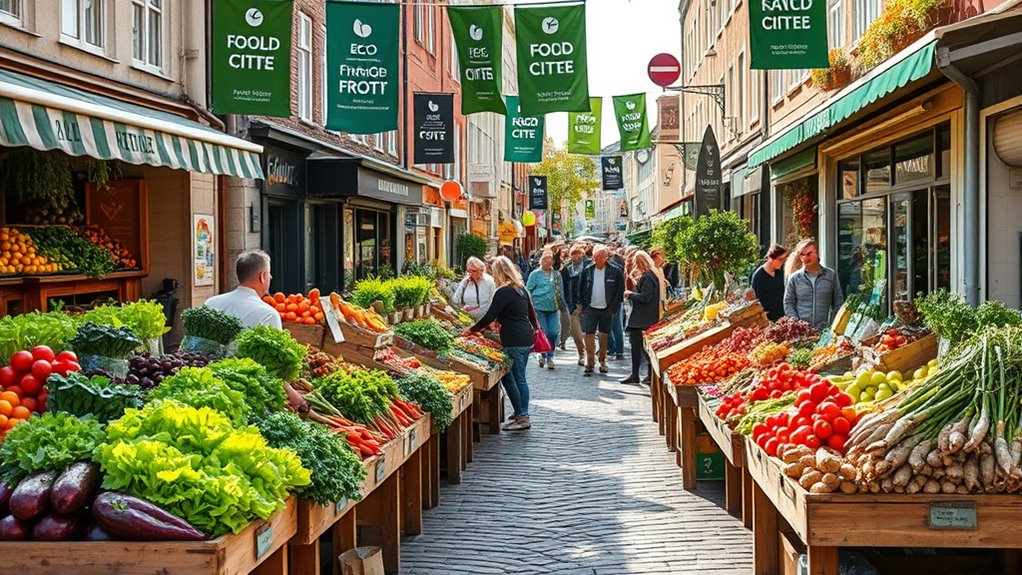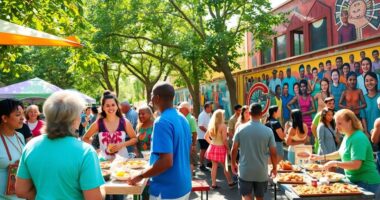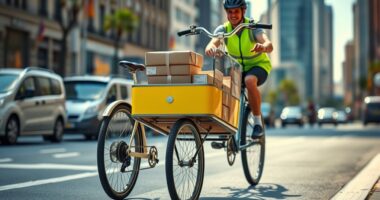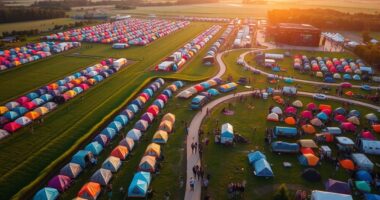At Roskilde, you’ll find a vibrant food scene that seamlessly blends local flavors with sustainability. The city supports nearby farms, reduces waste through composting, and encourages eco-friendly practices in restaurants. Community events raise awareness about sustainable eating and plant-based diets. Roskilde also tackles broader environmental issues with initiatives promoting green energy and urban farming. To discover how this city truly combines culinary richness with eco-conscious living, keep exploring what makes Roskilde’s food culture unique.
Key Takeaways
- Roskilde promotes local, seasonal, and organic foods to reduce environmental impact while celebrating diverse culinary traditions.
- The city supports local farmers and food producers, emphasizing sustainable farming and minimizing transportation emissions.
- Waste reduction is prioritized through composting, recycling, and banning single-use plastics in food establishments.
- Community programs and workshops educate residents and visitors on sustainable eating habits and reducing food waste.
- Broader initiatives include promoting eco-friendly energy solutions and sustainable urban food production practices.

Have you ever wondered how a city can combine vibrant food culture with sustainability goals? In Roskilde, this balance is not just an aspiration; it’s a reality. The city has embraced innovative strategies to promote local, eco-friendly food while maintaining its rich culinary traditions. As you explore Roskilde, you’ll notice how the city’s food scene reflects its commitment to sustainability. From bustling markets to restaurant menus, the focus is on reducing environmental impact without sacrificing flavor or diversity.
One of the key initiatives is supporting local farmers and food producers. You’ll see farmers’ markets thriving with fresh, seasonal produce that’s sourced directly from nearby farms. This approach not only cuts down on transportation emissions but also fosters a stronger connection between consumers and their food sources. By choosing local, you help reduce carbon footprints and encourage sustainable farming practices. Many restaurants in Roskilde prioritize organic ingredients and seasonal menus, aligning their offerings with ecological principles. When dining out, you’ll notice chefs creatively adapting recipes to incorporate local ingredients, emphasizing quality over quantity.
Supporting local farmers reduces emissions and strengthens community food connections through seasonal, organic ingredients in Roskilde.
Roskilde’s commitment to sustainability extends beyond sourcing. The city actively promotes waste reduction and recycling in its food establishments. Many cafes and eateries have adopted composting systems and minimize single-use plastics, making eco-conscious choices easy for visitors and residents alike. Additionally, the city encourages urban gardening and community farms, where residents like you can get involved in growing their own food. These initiatives foster a sense of shared responsibility and deepen your understanding of sustainable food production. Addressing issues related to wood-burning and environmental impacts can also inspire community-driven projects that promote greener energy solutions.
Public awareness campaigns also play an essential role. You might participate in workshops or events that educate about reducing food waste, choosing plant-based options, or understanding the environmental impact of food choices. These programs empower you to make informed decisions and incorporate sustainable eating habits into your daily life. The city’s commitment is clear: sustainable food isn’t a trend but a core value woven into Roskilde’s urban fabric.
Frequently Asked Questions
How Does Food City Plan to Reduce Its Carbon Footprint?
Food City plans to reduce its carbon footprint by implementing energy-efficient practices, such as using LED lighting and optimizing refrigeration systems. You’ll see them sourcing local and organic products to cut transportation emissions and waste. They also encourage customers to bring reusable bags and reduce packaging. By adopting these strategies, you help support a more sustainable future, making your shopping more eco-friendly and contributing to lower overall greenhouse gas emissions.
Are There Specific Local Suppliers Involved in Food City’s Sustainability Efforts?
Think of the local suppliers as the roots of a strong tree, anchoring the sustainability efforts. Yes, Food City partners with nearby farmers and artisans committed to eco-friendly practices. These local suppliers help reduce transportation emissions and support the community. By working closely with them, you’re not just buying products—you’re nourishing a sustainable future, making every choice at the store a step toward a greener planet.
What Are the Long-Term Sustainability Goals for Food City at Roskilde?
You aim to achieve long-term sustainability at Food City by reducing waste, sourcing locally, and lowering carbon emissions. You plan to implement eco-friendly practices, promote responsible consumption, and continuously evaluate your environmental impact. By fostering partnerships with local suppliers and engaging customers in sustainability initiatives, you guarantee ongoing improvements. Your goal is to create a resilient, environmentally conscious food environment that benefits both the community and the planet over time.
How Does Food City Educate Customers About Sustainable Choices?
You’re encouraged to explore signage and displays that highlight sustainable options, making it easy to choose eco-friendly products. Food City also offers workshops, tastings, and educational sessions that inform you about sustainability benefits and responsible consumption. Additionally, staff are trained to provide guidance and answer your questions, helping you make informed decisions. Through these initiatives, you’re empowered to support sustainability in your daily shopping habits.
What Challenges Has Food City Faced in Implementing Sustainability Initiatives?
You might face challenges like balancing cost and sustainability, convincing suppliers to meet eco-friendly standards, and educating customers about new choices. Resistance to change can slow progress, and limited resources could hinder implementing innovative practices. Additionally, tracking the impact of sustainability efforts requires effort and data. Despite these hurdles, staying committed and engaging your community can help overcome obstacles and make meaningful progress toward greener operations.
Conclusion
So, next time you stroll through Food City at Roskilde, remember you’re not just shopping — you’re starring in a eco-drama. Picture yourself wielding a compostable bag like a superhero cape, saving the planet one organic apple at a time. Who knew sustainability could be so glamorous? Keep up the green fight, because if we don’t, future generations will be stuck with a world so fried, even the cows will be wearing compost bins as hats.










